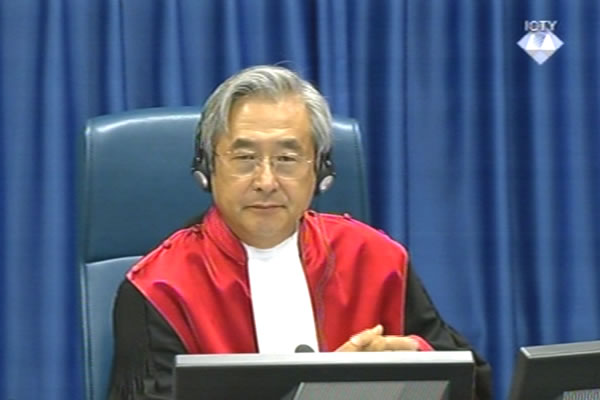Home
PROSECUTOR COULD HAVE FORESEEN KARADZIC’S ARGUMENT
The Trial Chamber’s decision denying the prosecution's motion for rebuttal of Karadzic's defense case was made public. The prosecution had sought leave to call 14 new witnesses in rebuttal. Although the judges agree that the contested evidence ‘raises significant issues’, and that the accused hadn’t indicated he would be calling it in his pre-trial brief, they ruled that the prosecution could ‘reasonably have foreseen’ that this evidence would be called. At the beginning of the trial, Karadzic clearly indicated he would contest all of the adjudicated facts
 O-Gon Kwon, judge in the Tribunal
O-Gon Kwon, judge in the Tribunal Last Thursday, Judge Kwon's Trial Chamber dismissed the prosecution’s motion seeking leave to reopen the case to call evidence on the mass grave in the Tomasica mine. On Friday, the judges denied the prosecution’s motion to call additional witnesses in rebuttal of the evidence Radovan Karadzic called in the course of his defense case to challenge some of the adjudicated facts. Those facts, established at other trials, were formally taken notice of by the judges in his case. The explanation of the decision was made public today, as the Tribunal was closed until this morning due to the Nuclear Security Summit, held practically next door to the Tribunal.
The prosecution wanted the Trial Chamber to allow them to call 14 new witnesses to corroborate the adjudicated facts on the incidents in Bijeljina, Bratunac, Foca, Kljuc, Prijedor, Sarajevo and Srebrenica. In the course of his case Karadzic contested those adjudicated facts. As the prosecution noted in the motion, the need to rebut the evidence arose primarily from the fact that the prosecution had, in line with the Trial Chamber’s orders, largely relied on the adjudicated facts in the course of its case. Secondly, the prosecution argued, it was difficult to foresee the nature of Karadzic’s counter-arguments, given the ‘inconsistent, illogical and chaotic’ way in which the defense case had been managed.
In line with the Tribunal’s rules, the prosecution is entitled to call additional evidence if, in the view of the Trial Chamber, ‘there is a need to respond to significant issues raised in the defense case that the prosecution couldn’t reasonable foresee’.
The Trial Chamber analyzed in detail the way in which Karadzic contested the adjudicated facts on all the incidents listed in the prosecution’s motion. Karadzic argued that the victims from Bijeljina, Bratunac, Foca and Kljuc ‘died in combat’ because they were killed and didn’t die in the attacks of the Serb forces; that there was no massacre in Room 3 in the Keraterm prison camp but ‘a prisoners' revolt' and an ‘escape attempt’. Karadzic also claimed that the Muslim forces were responsible for the artillery and sniper incidents in Sarajevo and that Srebrenica captives were not executed on the river Jadar bank on 13 July 1995.
The Trial Chamber agreed with the prosecution’s claim that the evidence Karadzic called to contest the adjudicated facts did raise ‘significant issues’, and thus met the first requirement for rebuttal evidence to be called. As the Trial Chamber noted, in its pre-trial brief the defense didn’t announce it would be contesting particular adjudicated facts. The judges nevertheless decided that the prosecution ‘could and should have foreseen that’, in light of Karadzic’s ‘general announcement’ that he would contest all adjudicated facts and all aspects of the prosecution’s case… except for the weather on the days of the incidents he had been charged with.
Now that all its motions for additional evidence have been denied, the prosecution has to focus and try to reemphasize the key elements of its case in the final brief and closing arguments, scheduled for 29 September 2014.
Linked Reports
- Case : Karadzic
- 2014-03-21 CLOSING ARGUMENTS AT KARADZIC TRIAL SLATED FOR 29 SEPTEMBER 2014
- 2014-03-20 TOMASICA EVIDENCE ‘NOT IN THE INTEREST OF JUSTICE’
- 2014-03-19 KARADZIC AGAINST TOMASICA EVIDENCE
- 2014-05-05 KARADZIC WANTS BIFURCATED JUDGMENT
- 2014-05-21 KARADZIC CALLS FOR AN INVESTIGATION OF THE PROSECUTION
- 2014-05-23 KARADZIC’S MOTION FOR BIFURCATED JUDGMENT DENIED
